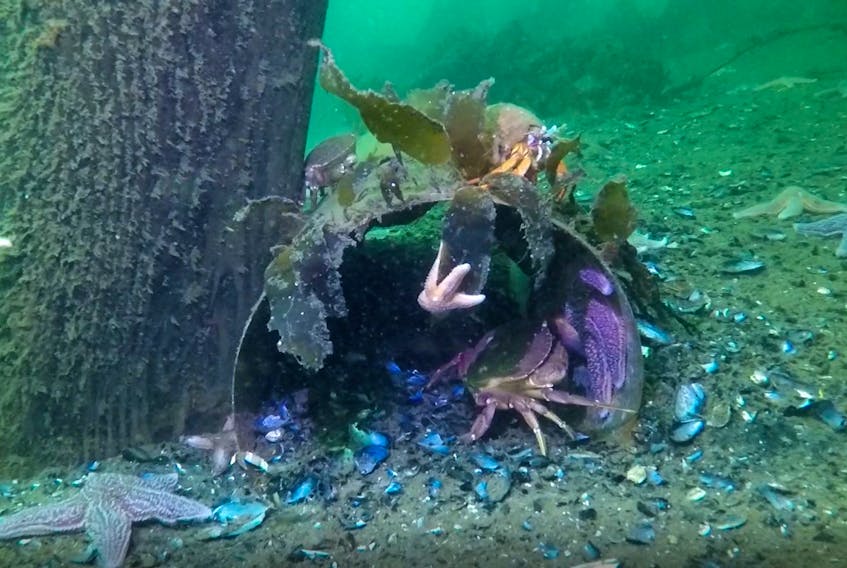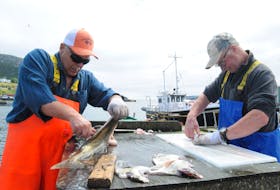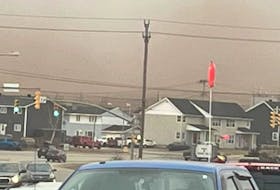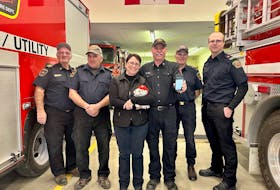MARYSTOWN, N.L. — When trash is thrown out a car window, it winds up on the roadside, easily visible for everyone to see and tut-tut about.
Not so for garbage thrown over the sides of fishing and recreational vessels, however.
It collects on the ocean floor, out-of-sight and out-of-mind.
“I see it as a being a major problem,” says Marguerite Drake, supervisor of the harbour authority in Burin.

Drake says fish harvesters have limited options onshore for disposing of old nets and pots, and the harbour authority is restricted, as well, in what it can do to help.
“Fishermen are not going to bring them to land with nowhere to put ‘em, we can’t accept them, so they’re going overboard,” she says.
Then there’s the matter of ordinary, everyday waste gathered up while at sea, or sometimes even just tossed in the harbour or left lying around when in port.
Like businesses on the Burin Peninsula, harbour authorities and other non-profit organizations are subject to local waste management regulations. The weekly limit for pickup is seven bags of garbage.
“You take it if you got 20, 30, 40 enterprises at your harbour and all of them comes in maybe twice a week for the bigger boats and once a day for the smaller ones, they’re coming with garbage,” Drake says.
“Where is it going to? They can’t give it us. We just don’t have the room for it. We can’t take it anyway because we can’t get rid of it.”
Burin is a busy port, Drake says, but it can’t afford to be paying out big bucks for waste, adding the harbour authority does what it can to lend users a hand, but that’s only so much.
She believes waste management rules should be amended for harbour authorities to reflect the unique situation.
Ship-to-Shore
Mary Alliston Butt, ocean conservation coordinator with the Newfoundland and Labrador chapter of the Canadian Parks and Wilderness Society’s (CPAWS), also says marine debris and land waste management is a significant issue.
Butt manages CPAWS-NL’s Ship-to-Shore project.
"Some fishers (when they) are from the area bring (their waste) home and put it with their personal garbage, which is a great alternative, but it doesn't fix the issue," says Butt.
In a province so reliant on the sea, more than just fish harvesters are obviously contributing to the problem, she says.
“It’s a range of ocean industries,” Butt acknowledged.

The Ship-to-Shore project’s mandate is quite broad with its main focus being on reducing marine debris and raising awareness about the issues, Butt says.
Last fall, her work brought her to the Burin Peninsula, including Burin, Fortune, Garnish, Grand Bank, Lawn, Lamaline and St. Lawrence, to meet with local harbour authorities and host a variety of activities.
“All around the ‘Boot’,” she said with a laugh.
Marine debris causes many problems, including damaging the habitat creatures of the sea rely upon. Plastic ingestion is another concern.
“A lot of whales and birds and fish, all marine species, are turning up with bellies full of plastic. Once it gets in their stomach, they actually can’t digest it, so it stays there,” Butt says.
Discarded trash sometimes becomes part of the habitat. That’s unfortunate, Butt says, but when an old castoff item becomes a home for sea life, it’s best to leave it be.
“You see a lot of garbage that’s being used for habitat. It’s sad to see … but it’s benefiting them because they don’t have anything else around,” she says.









